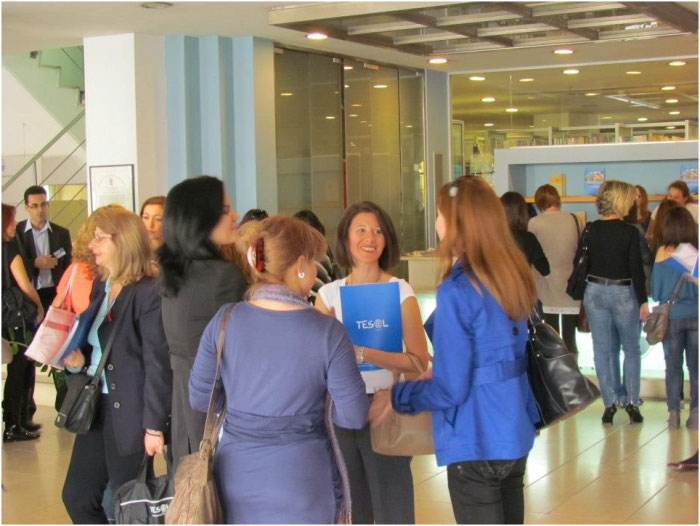The Big SIG Day is one of our oldest and longest-standing event. Every year the four Special Interest Groups, Young Learners, EAP/ ESP, Drama and Literature and MM / CALL, or Learning Technologies, join forces in a mini convention that features presentations for all interests.
In recent years it also features a plenary session. This year, we were fortunate enough to have our very own Danae Kozanoglou present for us. Her topic: “ Well trodden paths can be deceiving …”
“A scaled, in fact an over-scaled mountain, has risks in store that a seasoned climber would be aware of. A deep niche that holds well is an added bonus, yet one that has been over-used is likely to have acquired a shiny patina and pretty though it might look, it no longer holds the attributes of a safe foothold.
Eftichis Kantarakis, TESOL Greece Newsletter editor
We have such paths in learning/teaching, whose vintage sheen has led to entrenched and seemingly well-advised procedures and practices. Yet, something is askew; something is partial, not quite there! Let’s try to identify these paths and make some “simple” distinctions that might restore favourite footholds.”
More than 100 members attended her talk and we were all awarded with ideas and insights that can shape the way we teach. Ms Kozanoglou also gave an interview to Yorgos Tahtsidis during that very informative conference. It will soon be available online, and you will have the chance to read about it in one of our next Newsletters.
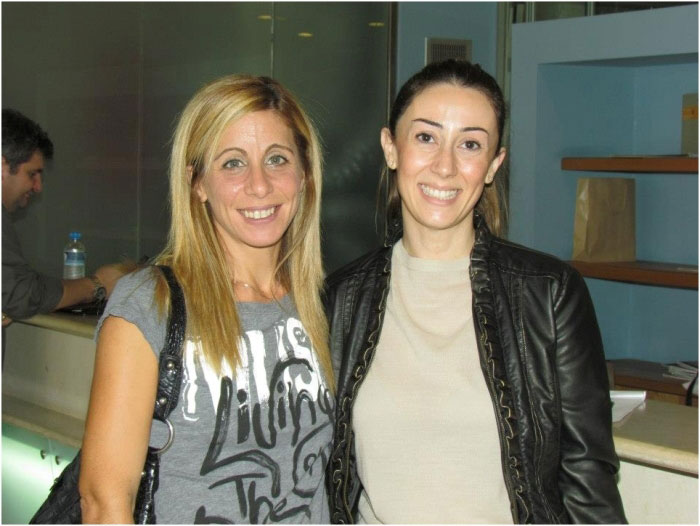 Young Learners Special Interest Group
Young Learners Special Interest Group
By Vaggelis Chourmouzis
The first presentation was about Phonics by Ms Niki Iliopoulou and Ms Grace Marinos. They showed us that phonics can play an important role in the development of students' reading skills.
We went through the different stages of Reading development (Emerging Phase, Early Development Phase etc.) acquiring knowledge of why it is important for students to be taught phonics, and then we were showed how to teach them.
The two ladies asked for volunteers and we played games like Bingo!, in which our goal was to formulate a word or phrase. Finally, we all understood the positive outcomes of teaching phonics, like the development of independent readers or the impact on students’ literacy skills.
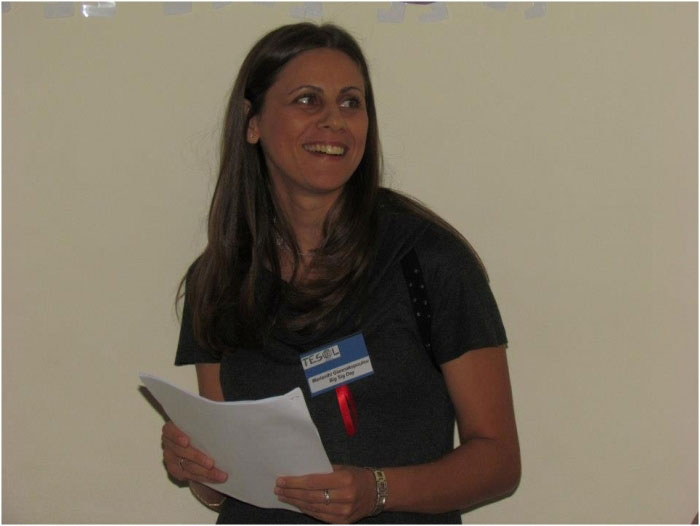 The second presentation was about a very sensitive problem in our classrooms nowadays. Ms Marianthi Giannakopoulou showed us how to teach students with ADHD (Attention Deficit Hyperactive Disorder).
The second presentation was about a very sensitive problem in our classrooms nowadays. Ms Marianthi Giannakopoulou showed us how to teach students with ADHD (Attention Deficit Hyperactive Disorder).
We were told about the symptoms of ADHD, we saw interviews with children with ADHD and the way they behave.
The point was clear: teachers should treat these students with respect. They are just students with different needs.
So, Ms Giannakopoulou demonstrated classroom strategies on how to cope with these situations. The presentation was powerful and full of useful information.
EAP/ ESP BIG SIG
By Maroussa Pavli
This report provides a summary of the talks presented by members of the EAP/ESP SIG Group at the BIG SIG Day at IST ON November 4th 2012. The two presenters of this SIG group were Panagiota Frytzala and Rania Katsara.
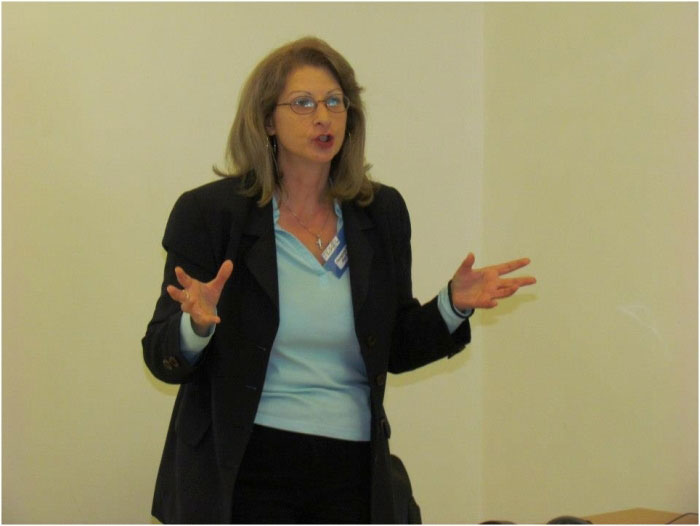 Panagiota Frytzala’s presentation title was “The use of the L1 in the ESP/EAP classroom”. During her talk, she provided her audience with an overview of the theories of language transfer, the influence of the L1 on a learner’s interlanguage, the conditions and types of language transfer, as well as the use of mediation activities in the EAP/ESP classroom.
Panagiota Frytzala’s presentation title was “The use of the L1 in the ESP/EAP classroom”. During her talk, she provided her audience with an overview of the theories of language transfer, the influence of the L1 on a learner’s interlanguage, the conditions and types of language transfer, as well as the use of mediation activities in the EAP/ESP classroom.
When talking about the theories of language transfer, she analysed the Contrastive Analysis Hypothesis (CAH), which sees the interference of the L1 with L2 as the main problem and supports that a teacher/linguist can know the degree of difficulty that a specific aspect of L2 would present for the learner.
Three degrees of transfer influence this; positive, negative or zero. Panagiota viewed critically this theory discussing its merits and problems.
The second theory of language transfer that she examined was the ‘Markedness Differential Hypothesis’, which sees contrasts between languages, through the study of the linguistic principles governing all languages. This theory is based on the concept f a ‘Universal Grammar’.
After discussing the theory in question, Panagiota moved on to talk about the role of the Interlanguage and the ways in which interlanguage can be influenced. She also talked about the importance of background knowledge and the process of Second Language Acquisition and positive/ negative transfer which results in interference.
The last part of the presentation was about possible uses of L1 in the classroom in activities which involved mediation. The latter differs from translation, as it focuses on the essence of the message, while translation focuses on the whole message.
After clarifying this important aspect of mediation, the presenter suggested activities for beginners and advanced learners, as well as professionals in the business and medical sector that can incorporate mediation as a way of communicating ideas or assessing language performance through writing, speaking, listening and reading.
Rania Katsara had chosen ‘Effective classroom management techniques for an EAP classroom’ as a topic of her talk consisting of three parts. The first part gave the audience a brief overview of Language for Specific Purposes in Greek Universities and the second part presented the rationale for the use of culturally responsive pedagogy for effective teaching.
The third part discussed in detail theories of classroom management as well as useful suggestions and examples of suitable management techniques for Greek students in an EAP university classroom.
One of the characteristics of Greek students that she mentioned was their preference for explicit instructions and their frustration by the concept of independent learning. As far as theories of classroom management are concerned, she analysed three significant ones. Firstly, she talked about Skinner’s theory of reinforcement that was developed in 1950 and introduced the concepts of positive or negative reinforcement.
Secondly, she mentioned the Choice Control Theory, suggested by Glasser in 1970, which refers to six conditions of quality work, which are very important in terms of classroom management. Thirdly, she analysed Lee Carter’s and Associates 1976 assertive discipline plan.
This plan talks about guidelines which teachers can use to communicate their expectations to students assertively. This assertive discipline plan includes class rules with positive and negative consequences.
The effective implementation of these consequences mean that the teacher should be firm, clear and consistent towards their students and should not embarrass them in front of their peers.Teacher professionalism should prevail, as teacher should teach students decision-making and be a good role model.
Rania also clarified the concepts of principles, rules and procedures and emphasised their importance for instruction to continue in an effective way. Finally, she used suggestions and examples of activities and instructions governed by the theories discussed earlier.
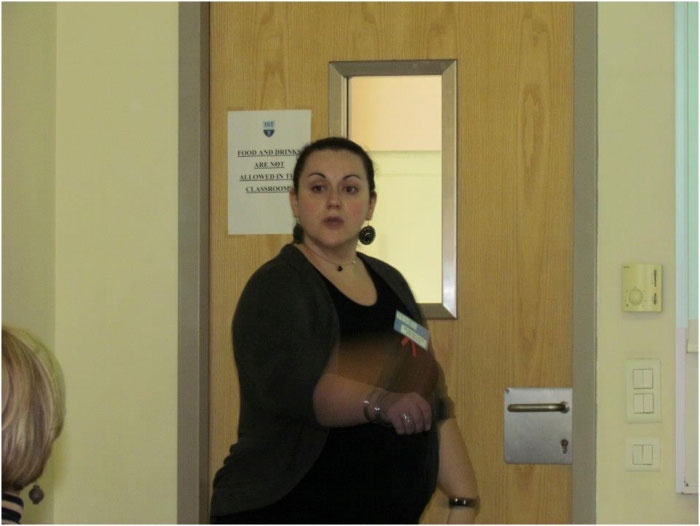
The Drama/Literature SIG also treated its members with two presentations.
Ms Margarita Leonti presented the topic of “Incorporating Literary Genres in the EFL Classroom: easier… done than said”. She showed us how easy it is to incorporate various literary genres in syllabi meant to be used in EFL classes effectively.
She presented tips on how to make the most of short stories, poems, theatrical plays, and other literary genres, and she also summarized the criteria according to which literary texts can be chosen as appropriate for classroom use.
The presentation was brought to a close with a hands-on experience that gave the audience a chance to experiment with these literary genres.
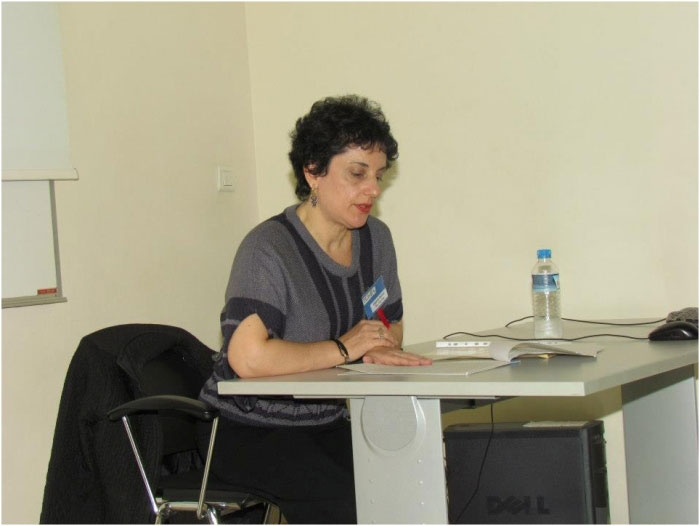 Ifigenia Sarros talked next on “Literature in the context of the history of Australian Literature and Literature of the Cultural and Historical development of Australian society”.
Ifigenia Sarros talked next on “Literature in the context of the history of Australian Literature and Literature of the Cultural and Historical development of Australian society”.
She gave her audience an insight into Australia literature. More Literature-oriented than Drama, this presentation catered for the interests of the members of this Special Interest Group.
MM / CALL Special Interest Group
The MM / CALL, or Learning Technologies SIG featured two very interesting presentations.
Anna Petala (the SIG co-ordinator) with George Stefanides presented “3 steps to innovation”. The tools they presented were used and practised by all participants.
Christina Markoulaki presented next. Being an experienced blogger, Christina presented on “Blogging in the EFL classroom”.
Christina demonstrated all the steps into creating a blog with our students, combining fun and learning through entertaining project work.
